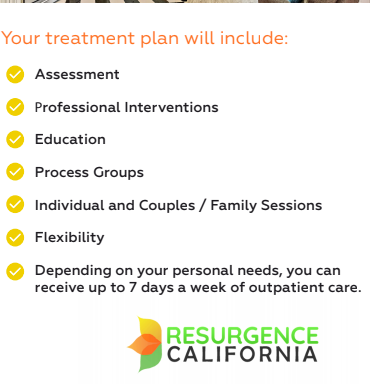Resurgence Behavioral Health Aftercare Programs
Aftercare Programs prove to decrease the chance of relapse after addiction treatment at Resurgence Behavioral Health

Costa Mesa, United States – December 15, 2020 /MarketersMedia/ —
An aftercare program is regularly recommended to treat and support the recovering person after drug rehab. Addiction-related programs also provide training for patients and their families to help prevent relapses and improve recovery duration and quality.
A study published in the American Medical Association Journal estimates that 60% of those treated experience relapses from substance use disorders. The Drug Abuse and Mental Health Administration reports that more than half of all drug overdose deaths are related to drug
addiction.
Staying on the path to full recovery requires more than a personal willingness to remain sober. Rehabilitation at Resurgence Behavioral Health and aftercare are necessary, following any form of medical treatment that helps individuals begin recovery. The fight against substance abuse does not stop once a person has completed rehab, but it is an integral part of the long-term recovery process for people with substance use disorders.
The overarching goal of rehabilitation and aftercare is to help patients continue their lives in sobriety and prevent relapses. The program consists of support services consisting of multidimensional activities to improve the patient’s mind, body, and spirit. Sober living treatment of substance dependence can be considered as a necessary next step in the long-term recovery process of people with substance abuse issues.
The key to sustained recovery is the patient’s commitment, and planning for an aftercare program must involve him fully. There is no one-follow-up program; this is why Resurgence adapts to each individual’s needs.
How to Develop a plan for After Care
Usually, their rehab program will tailor a set of aftercare elements and goals for each patient, based on discharge evaluation and particular patient needs. In some circumstances, such as court-ordered therapy, diversion, or other work/employment drug and alcohol support programs, aftercare participation is mandatory and closely monitored. While they may be involuntary in some cases, treatment and aftercare are no less effective because of it.
Examples of some of the components leading up to and involving many aftercare plans include:
-A relapse prevention strategy was drawn up and rehearsed before the end of initial treatment.
-Prescription for consistent participation in addiction support/self-help groups (frequently 12-step meetings such as Alcoholics Anonymous or Narcotics Anonymous)
-Regularly scheduled outpatient follow-up appointments with a clinician/counselor for continued therapy
When needed, arrangements for a controlled living environment post-treatment – halfway houses, sober living, etc.
Recommended or required drug testing
-Monitoring: can be done during scheduled appointments, on the phone, or by email. The information age has ushered in various newer methods for continued patient care, including video appointments, text message check-ins, and other support and tracking apps.
RECOVERY IS NOT EASY
It’s essential to find a supportive environment to assist in avoiding temptation 24/7. This involves the support system members removing any mind-altering substances from home, avoiding using intoxicating substances in front of the recovering individual, and encouraging full compliance with the aftercare plan.
Aftercare programs after Resurgence Behavioral Health Treatment have proven successful; for more information, visit them today.
Contact Info:
Name: Resurgence Behavioral Health
Email: Send Email
Organization: Resurgence Behavioral Health
Phone: Call Us 877-321-2716
Website: https://resurgencebehavioralhealth.com/
Source URL: https://marketersmedia.com/resurgence-behavioral-health-aftercare-programs/88990108
Source: MarketersMedia
Release ID: 88990108